Egypt Approves Tax Law Amendments To Support Businesses Hurt By Coronavirus
Egypt ‘s parliament’s budget and planning committee has approved a new batch of government measures to mitigate the negative impact of the coronavirus. At first, the committee approved new government-drafted amendments to the real estate tax law (196/20080).

“These amendments were approved by the cabinet and aim to relieve industries and businesses of some of the tax burdens to help them weather the economic storm of the coronavirus,” Egypt’s Minister of Finance Mohamed Maait said.
Here Is All You Need To Know
- By the terms of the new amendment, land owned by industries and businesses are exempted from the real estate tax provided that these lands are used in industrial and production activities.
- The executive regulations will give the finance minister the power to estimate the value of the tax exemptions and determine how long they will be in place.
Read also:Egypt’s Fintech Startups Khazna & Brimore Secures Funding To Scale Operations
“And upon a report to be submitted by the finance minister, the cabinet will decide whether industries using their affiliated lands in industrial, strategic and service activities are eligible for real estate tax exemptions,” said the government report on the amended law.
-

The Gross Domestic Product (GDP) in Egypt was worth 280 billion US dollars in 2019, according to official data from the World Bank and projections from Trading Economics. The GDP value of Egypt represents 0.23 percent of the world economy. - The committee also approved government-drafted amendments to the income tax law.
“The amendments help these brackets relieve some of the income tax burdens, and I can say that these amendments will help a low-income state employee raise his salary by EGP 2,000 ($126)a month,” said Ramadan Seddiq, advisor to Egypt’s minister of finance
Read also:Egyptian Accelerator Offers Startups $63k In Funding To Help Them Survive COVID-19 Crisis
- The budget and planning committee also approved a new budgetary allocation estimated at EGP 10 billion ($634m) to be earmarked to mitigate the negative economic impact caused by the coronavirus.
- Maait explained that due to the critical conditions imposed by the spread of the coronavirus, the government was forced to ask parliament to amend the 2019/20 budget to allocate the EGP 10 billion.
“This additional allocation aims to help the day and seasonal labourers who were very negatively affected by the precautionary measures taken to contain the coronavirus, not to mention that it also aims to push the wheels of production in many sectors,” said Maait, also explaining that “the EGP 10 billion is part of an emergency plan estimated at EGP100 billion which was approved by President Abdel-Fattah El-Sisi on 14 March to mitigate the economic cost of the coronavirus on Egypt.”
- The committee also approved a new government-drafted law on “financial measures necessary to contain the negative impact of the coronavirus on productive, economic and service sectors.”
- The law gives the cabinet the power to intervene to suspend the payment of certain taxes and other financial obligations such as social insurance or allow them to be paid in long-term instalments.
- The law states that the postponement will be for a renewable three-month period, and stipulates that businesses are not to fire workers or even cut their salaries.
- All of the above economic measures are expected to be approved by parliament in its plenary meetings scheduled today.
Charles Rapulu Udoh

Charles Rapulu Udoh is a Lagos-based lawyer who has advised startups across Africa on issues such as startup funding (Venture Capital, Debt financing, private equity, angel investing etc), taxation, strategies, etc. He also has special focus on the protection of business or brands’ intellectual property rights ( such as trademark, patent or design) across Africa and other foreign jurisdictions.
He is well versed on issues of ESG (sustainability), media and entertainment law, corporate finance and governance.
He is also an award-winning writer

